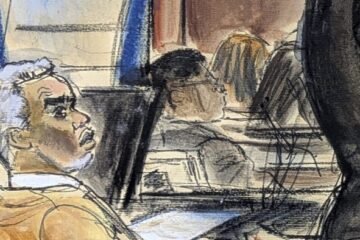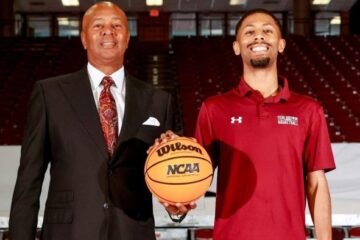JACKSON, Miss. — Inside John W. Dixon Hall at Jackson State University, a couple of black Maybelle telephones rested on a table in the lobby on the morning of Jan. 28, 1975, as Jackson State running back Walter Payton and middle linebacker Robert Brazile waited for two important phone calls.
“Nobody could be on the phone that day,” Brazile told Andscape.
It has been 50 years since the 1975 NFL draft changed the lives of 21-year-old Payton and Brazile, who was 10 days from his 22nd birthday, and marked the first time two teammates from a historically Black college or university were drafted in the first round in the same year.
They had dominated the 1975 Senior Bowl at Ladd Stadium in Mobile, Alabama, nearly three weeks before draft day. Brazile and Payton played on the South team, one that was coached by then San Francisco 49ers head coach Dick Nolan. Payton, who was among the 1974 Heisman Trophy candidates, was named Most Outstanding Offensive Player for the South team in the postseason all-star clash. Brazile, who had posted an impressive 4.6-second 40-yard dash time before the Senior Bowl, earned projections that he might land with the Dallas Cowboys at No. 2.
The calls for Brazile and Payton — the 5-foot-10-inch, 208-pound running back who had become college football’s all-time scoring king (66 touchdowns, 464 points) — came quickly. The Chicago Bears and then Houston Oilers drafted Payton and Brazile at Nos. 4 and 6, respectively, in the first round of the 1975 NFL draft. Tabbed as “Sweetness” and “Dr. Doom,” they became Jackson State’s third and fourth first-round draft selections, following former teammates wide receiver Jerome Barkum (1972) and defensive end Don Reese (1974).
“While it was a watershed moment in the university’s history, we were accustomed to their [Payton and Brazile’s] excellence,” said Hilliard Lackey, a 1965 JSU alum and longtime professor of urban higher education at the university. “JSU had reached a new level.”
The modern-day NFL draft provides a spectacle, with droves of players and fans in attendance and live, by-the-minute analysis of picks and prospects. However, before 1980, the bright lights and media exposure didn’t exist.
Brazile and Payton wasted no time in commencing an iconic celebration. By the time reporters from the Clarion-Ledger, The Associated Press and local TV stations arrived on campus seeking to interview the men of the hour in a news conference, the two future Pro Football Hall of Famers were missing in action.
Payton fired up a borrowed Suzuki motorbike while Brazile’s cousin lent him a motorcycle, and the two cruised through JSU’s campus and the heart of downtown Jackson wearing classic denim jean jackets, along with Kangol hats draping their jet Black afros. They hid from the press until their teammates — such as running back Rickey Young and linebacker John Tate — received calls about being drafted or becoming free agents.
As they went joy riding — which included a pair of celebratory cigars — they had to be cautious in their jubilant behavior, according to Brazile.
“We just wanted the other guys to get their calls before the press bombarded us,” the 72-year-old Brazile recalled. “So, we left. We weren’t supposed to have motorbikes on campus. This was also [JSU football coach] Bob [Hill] rules. We came out of hiding once all [teammates] received calls.”
With their NFL dreams in motion, everything began to fall in place. Still, as Brazile and Payton prepared to enter a new world, they were missing agents, especially with pro football suitors like the now-defunct World Football League (WFL) and Canadian Football League throwing wads of cash at the youngsters.
Tigers football coach Bob Hill introduced them to attorney Bud Holmes, a close friend from Hill’s days as a coach at Rowan High School in Hattiesburg, Mississippi, to steer them in the right direction. Holmes represented the 1973 first-round NFL draft pick and future Pro Football Hall of Famer Ray Guy, among others, at the time.
Initially, when Hill brought Payton, Brazile and Young — Brazile’s cousin — to Holmes’ farmside estate in Hattiesburg, Holmes said he struggled to “break the ice” with the duo, making him reconsider if he was the right agent for them.
“They were well-mannered and dressed to the nth degree,” he said. “But things felt different – I felt like I couldn’t connect with them.”
But after speaking with Hill and having multiple conversations with Brazile and Payton, Holmes gained their trust and built a longstanding business-turned-family-like relationship with them.

Phil Mascione/Chicago Tribune via Getty Images
Then Bears general manager Jim Finks and new head coach Jack Pardee — who was working in his first NFL coaching job and leading a franchise that won a coin flip versus the Cleveland Browns to take Payton at No. 4 overall — knew the talent Pardee was bringing to the Windy City.
A day before the draft, Finks called Payton and asked, “How would you like to play for the Chicago Bears?”
“Jim, I will play for anybody,” Payton responded.
Holmes persuaded Payton to spurn the WFL’s Chicago Winds for fear that the league would be extinct in a couple of years. He secured Payton a three-year deal worth nearly $150,000 per year with a signing bonus of more than $100,000. If Payton accomplished specific targets, or incentives, his agreement would be worth “nearly a half-million dollars,” according to the Chicago Tribune.
“The [Winds president Gene Pullano] was offering him roughly $75,000, a purple Cadillac and would take care of his apartment with [Rickey] Young as his roommate,” Holmes said. “I know Walter wanted to be with his friend. … I told Walter his future was in the NFL, despite many telling him to take the [WFL] money. … The Bears didn’t have much money. But after negotiations, Payton’s contract eclipsed what Archie Manning made entering the league.”
Including Payton’s bonus, he secured the second-highest contract in the franchise’s history. At the time, future Pro Football Hall of Famer Dick Butkus’ last contract included a five-year deal at $115,000 per year.
Payton embraced Chicago with the goal to help his mother, Alyne, his father, Peter, his sister, Pamela, and his brother, Eddie, after securing his contract.
At the time, the Bears had produced a 7-21 combined record in the two seasons since legendary Bears’ rusher Gale Sayers retired in 1972. Pardee felt Payton filled a “critical need” for the team.
“I don’t pay much attention to 40-yard speeds, but the thing about Payton’s 4.3 [40-yard dash] is his quick start,” Pardee said from the Bears’ 1975 draft headquarters in Chicago. “… He wasn’t any deep secret. Had we been in Atlanta’s [Falcons] [No. 1 pick] spot, we’d have chosen Walter Payton.”
After the Bears’ commitment to him, Payton was eager to make Chicago his home.
“When I get through with Chicago, they’ll be loving me,” Payton said after the Bears drafted him.
Brazile initially thought he would join the Cowboys’ organization and remembers draft day like it was yesterday. While Dallas opted to select Maryland defensive tackle and future Pro Football Hall of Famer Randy White, Brazile knew nothing about Houston and had not visited the city before the franchise selected him. But to Brazile, Oilers head coach Bum Phillips’ words to him on the other end of the phone were like a “badge of validation.”

“We’re taking you No. 6 overall to the Oilers,” Brazile recalls Phillips saying on draft day. “We [Payton and Brazile] finally felt like we got what was due to us. We made history and didn’t even know it. … I was ready to go to Houston that day.”
After his first meeting with the Oilers, Brazile struck a three-year deal worth up to $250,000, making him the highest-paid Oilers rookie in franchise history.
Brazile joined a Oilers franchise coming off a 7-7 campaign in 1974 and a roster that included 14 other HBCU players, among them future Hall of Fame defensive lineman Elvin Bethea (North Carolina A&T), cornerback Zeke Moore (Lincoln in Missouri), linebacker Ted Washington (Mississippi Valley State) and wide receiver Kenneth Burrough (Texas Southern). Brazile also played alongside other signature veterans in quarterback Dan Pastorini, wide receiver Billy Johnson, defensive lineman Curly Culp and linebacker Gregg Bingham, who helped Brazile become an elite pro and aided the Oilers to a 10-4 record in his rookie season.
“I was lucky to have a bunch of veterans who took me under their wings when I got [to Houston],” Brazile said. “Bum Phillips already had a good defense. I was just the missing piece that they needed.”
For Eddie Payton, “Walter’s big brother,” JSU’s longtime men’s and women’s golf coach or journeyman NFL running back and return specialist are all monikers he identifies with.
With regard to Walter – “the GOAT,” Eddie said – he can rattle off stories about the man behind the shoulder pads of the No. 34 jersey. He knows the relentless effort his brother and Brazile put into their craft. Their work ethic, however, started long before they were drafted or playing on Sundays.
After Walter’s success on the gridiron at Mississippi’s integrated Columbia High School, he landed under the leadership of Bob Hill at Jackson State. Hill served as the Tigers’ football coach from 1971 to 1976 after eight seasons as JSU’s offensive coordinator. W.C. Gorden, Hill’s defensive coordinator, later became the winningest football coach in program history. Together, they cultivated the talent of the Payton brothers, Brazile and countless others en route to a share of four SWAC titles (1971, 1972, 1973 and 1975).
“There’s no Walter Payton or Robert Brazile without Bob Hill,” Eddie said. “He [Bob] demanded excellence from us. [Walter and Robert] put their soul into becoming the best version of themselves. Their internal engines ran at 100 miles per hour and never cut off.”
Gorden also was critical to Brazile’s prowess.

“Gorden’s defense could beat any [NFL] team,” Brazile said. “When I went to my first Oilers’ practice, I was overprepared, although some of the terminology was slightly different.”
Strong leadership from coaches also brought out the best in Walter and Brazile when they competed against each other in practice. During football season, the team scrimmaged Monday through Thursday each week, and practices were physically brutal.
“There was fresh blood on the practice field at all times,” Brazile said.
Although Walter ran the ball hard, he displayed a strategic approach. His speed, elusiveness and massive stiff arm made him special. Lackey, the JSU alum and professor, earned a front-row seat to Walter’s deliberate mindset both on and off the field. Lackey filmed games and practices using 16-millimeter film while serving as the university’s director of alumni affairs from 1971 to 1975.
He recalled competing with Walter in a round of roughly 10 games of Checkers during the running back’s freshman year. Lackey, who considered himself a master of the board game, met his match against the Tigers’ star running back – he defeated Lackey eight times.
“I was shocked he could play as well as he did,” Lackey said, laughing.
Walter’s vision and astute attention to detail carried over on the field, making it hard for Brazile and his teammates to bring him to the ground.
“I listened to Brazile tell the Tigers’ defense during practice scrimmages, ‘Let’s go out there and stop this [Payton] dancing machine’ for years,” Lackey said. “I had four classmates — Verlon Biggs, Frank Molden, Gloster Richardson and Roy Hilton — who played in the NFL. I thought they were the best players on the planet. … However, I was convinced that those two [Payton and Brazile] were the greatest football players who ever lived on any level.”
Brazile and Payton’s monumental draft selections marked the tail end of a golden age for HBCU football.
Seven years prior to Brazile and Payton’s selections, JSU produced 11 NFL draft selections in 1968 under then head coach Rod Paige. However, as predominantly white institutions began to identify the need for Black athletes in their programs, athletes slowly began integrating those schools in the late 1960s and early 1970s. It led to talented Black players choosing to play at PWIs versus HBCUs in future decades. By 1972, for example, all of the schools in the Southeastern Conference had at least one athlete of color on a varsity team.
As JSU prepares to commemorate 50 years of the 1975 graduating class at the spring 2025 commencement in May, Richard Shaw is assembling the graphic for the class T-shirt to celebrate the occasion inside his shop, Dynastics Screen Printing. The class slogan reads “Tigers Through and Through: The Year of Sweetness.”

Jackson State University via Getty Images
Shaw, a 1977 JSU alum who owns Mississippi’s oldest Black-owned screen printing company, is friends with Brazile and was also a friend of the late Payton. As he produces the shirts, every so often Shaw reflects on the “unbelievable” moment of seeing Brazile and Payton become first-round NFL draft picks.
“JSU was like a Power [Four] school in the 1970s,” he said. “When I watched them play for the first time, I immediately saw greatness. When Walter died, I cried like he was a member of my family. He was an all-world [athlete] and truly the greatest of all time.”
From the draft day phone calls in Dixon Hall to becoming two of the only four HBCU football players in the Pro Football Hall of Fame to be selected in the first round of the NFL draft, Payton and Brazile changed the game. From 1961 to 2002, 94 JSU players were drafted into the NFL. Since 2003, only three JSU players have heard their names called.
Jackson State safety Robert McDaniel and running back Irv Mulligan hope to change that narrative during this week’s draft. But even if they don’t succeed, history tells them that their aspirations are still possible with determination and hard work with predecessors such as Payton and Brazile.
“They were one of one,” Lackey said. “They were the epitome of greatness.”











